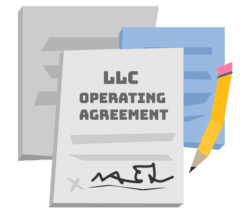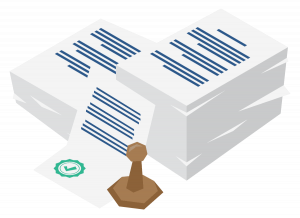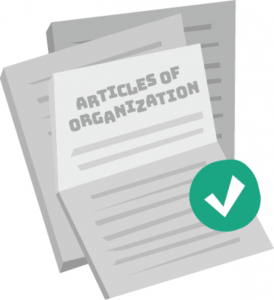Start a Business in Georgia
Starting a business in Georgia is easy. All you need to do is file a few forms with the Georgia Secretary of State and start running your business. Below, we show you how to get started and walk you through some of your options.
One option is, of course, to stop reading and just hire us to start your business for you. At Northwest, we form businesses and provide registered agent service throughout the US. That’s our business, and obviously we recommend starting your business in a certain way. We call it “Starting a Business the Right Way.”
When You Want More
$39 + State Fees
When we form your company, you get everything you need to start your business from scratch.
- Business Entity Formation
- Business Phone Service and Email Address
- Website and Web Hosting
- SSL Security
- Domain Name
- Privacy by Default®


1. Pick a Business Structure
If you’re already selling goods or services, you may own a business and you don’t even know it. Getting paid for your homemade peach pies? You’re a sole proprietor. Baking those pies with a friend? That’s a general partnership. In either case, you’re operating a business without liability protection, which means your personal finances are intertwined with your business finances. If your business goes south, your personal assets (house, car, commercial oven) could potentially be taken down with it.
To get liability protection, you’ll need to form a business entity. An entity is just something with its own, independent existence. This means registering with the state. The two most common business entities with limited liability protection are LLCs and corporations.
Georgia Limited Liability Company (LLC)
LLCs are a popular option for small businesses or those with growth potential because they provide a lot of flexibility. Structurally, you can run your business yourself or hire a manager (or managers) to oversee things. And when it comes to taxes, you can choose from a few tax classifications, which is not the case for most business entities. To start a Georgia LLC, you’ll need to file paperwork with the Georgia Secretary of State, Corporations Division.
Georgia Corporation
Corporations have rigid rules to follow, as compared to LLCs. Corporate structure typically requires three tiers of management (shareholders, board members and officers), and these tiers are all obligated to follow corporate rules governing meetings and record-keeping practices. Because of these rules, corporations have more layers of accountability, which can be appealing to donors and investors. To form a Georgia corporation, you’ll have to file paperwork with the Corporations Division.
Georgia Single-Member LLC
A one-person LLC is called a single-member LLC. Single-member LLCs are one of the most common kinds of businesses in the country. For the most part, single-member LLCs are just like multi-member LLCs, but there are some slight differences in how they file taxes and protect personal assets.
Read all about Single-Member LLCs.
Georgia Nonprofit
You can only start a Georgia nonprofit corporation if your organization serves a group’s shared interest (like a homeowners association), or benefits the public in some way (like a religious or educational institution). To start a Georgia nonprofit corporation, you’ll need to file Articles of Incorporation with the Corporations Division. (If filing by paper, note that this is the same form used for for-profit corporations—you’ll just select “nonprofit” for corporation type.)
Want to learn more? Check out our Nonprofit Guide.

2. Name Your Business
Naming your business can be fun, but it’s also a process. If you’re a sole proprietor, you’ll have to use your own first and last name for your business (Ray Jones) unless you register a DBA name that’s more specific (Ray’s Automotive).
If you own an LLC or corporation, your business name will need to meet Georgia’s requirements. This means your name must:
- Use an appropriate identifier, like “LLC” for a limited liability company or “Inc.” for a corporation.
- Be unique in the state of Georgia.
- Not use words that indicate a false business purpose (like “charity”) or a job you’re not authorized fulfill (like “police” or “doctor”).
- Not contain any language the state considers obscene.
- Not exceed 80 characters (including punctuation and spaces).
You can file a Name Reservation Form with the Georgia Secretary State online ($30) or by mail ($35). Reserving your business name is not required, but it may be helpful if you’ve got your name picked out and aren’t yet ready to file formation paperwork with the state.
Filing a Name Reservation will put your business name on hold for 30 days, or until you file paperwork with the state—whichever comes first.
It’s a good idea to check with the US Patent and Trademark Office (USPTO) to make sure your business name hasn’t been trademarked by someone else. If it has, and you use it anyway, there’s a chance that the business could come after you for infringement.
Find out if your desired name is available in Georgia by searching the Georgia Business Records.
Georgia DBA
A DBA is any name you use for your business other than its legal name. (DBA stands for “doing business as.”) Your business’s legal name is what’s listed on its formation documents—or, if you’re a sole proprietor, your own name.
To operate under another name, you’ll have to register a trade name (Georgia’s term for DBA) in the county or counties where you conduct business. For domestic corporations, specifically, trade names must be registered in the county where their principal address is located.
Read about How to Get a DBA Name in Georgia.

3. File Formation Paperwork
Sole proprietors and general partnerships do not need to file formation paperwork with the Georgia Corporations Division. They do, however, need to register their business as a “sole proprietor” or “partnership” with the Georgia Tax Center.
But LLCs and corporations in Georgia must register with the Georgia Tax Center as well as the Secretary of State, Corporations Division. Filing paperwork with the Corporations Division will make your business an official entity.
- To form a Georgia LLC, file Georgia Articles of Organization.
- To form a Georgia Corporation, file Georgia Articles of Incorporation.
If filing paper documents, you’ll have to include what Georgia calls a Transmittal Information Form for your LLC or corporation, along with your articles. Oddly enough, the transmittal form is more comprehensive than the state’s Articles of Organization Form—but information from both forms will appear on your public record. (The online filing process doesn’t distinguish between the information in your articles and the information on the transmittal form.) Corporations also have a publication requirement.
You’ll need to include the name and address of a Georgia registered agent when filing articles with the state. This is someone who will handle important legal documents on behalf of your business. Once your forms are completed, you’ll need to submit them to Georgia’s Secretary of State, Corporations Division. Online filings cost $105, in person and mailed filings cost $110.
Note: Any information you include in your articles—except for your business’s email address—will become part of the public record, and be available to search online.
How can I keep my information off the public record?
The simplest way to keep your personal information out of the public record is to leave it off your formation documents entirely. If you hire a registered agent service like Northwest, you can use our address instead of your own.
What is a registered agent?
A Georgia registered agent handles legal notices (called service of process) for your business. So, if your business gets subpoenaed or sued, legal documents will be delivered to your registered agent, who is then responsible for delivering them to you. For this reason, your registered agent must be available during regular business hours to receive then quickly deliver service of process to you, the business owner.
While you can be your own registered agent in Georgia, doing so might not be practical if your job requires you to leave the office. And since service of process is nothing to trifle with, many businesses choose to hire a registered agent service as a reliable point of contact.

4. Draft Internal Records
So far in this guide, we’ve dealt with public forms that you’ve had to file with the Georgia Corporations Division. Now, it’s time to organize your internal records. These are the documents your business will keep on record within your company.
Though these documents are internal, you’ll likely need to show them to third parties like the bank or—if you start a nonprofit—the IRS.
Here are the major internal documents you need to organize for LLCs and corporations:
Georgia LLC Operating Agreement
This is your LLC’s rule book. It defines how your LLC will do things like make decisions, distribute money, manage operations, and appoint officers. Your operating agreement plans for every big picture scenario your LLC is likely (or unlikely) to face, including dissolution.
Drafting an operating agreement is hard, and the internet is full of shabby templates that have been copy and pasted from who knows where. So we had our attorneys draft a Georgia LLC Operating Agreement template that you can use as a solid foundation.
Georgia Corporate Bylaws
Bylaws are the rules your corporation will adopt and follow internally. Bylaws detail how your corporation will appoint directors and officers, hold shareholder and board meetings, and handle emergencies, among other things. Unlike operating agreements, corporate bylaws are required by law in Georgia (see GA Code § 14-2-206).
As with operating agreements, you can find plenty of bylaws templates online. But bylaws are pretty serious, so you don’t want to just use the first template you come across. Our attorneys drafted a Georgia Corporate Bylaws template you can use to get started.
Starting a nonprofit? Learn about Georgia Nonprofit Bylaws.

5. Get Georgia Business Licenses
Georgia does not issue a general, state-wide business license. But you may need a local or professional license. Here’s what you need to know:
Georgia State Business License
Business licenses are required in many states as a way of registering businesses for state taxes. While you won’t need a general, state-wide business license in Georgia, you will have to register your business with the Department of Revenue. You can do this online through the Georgia Tax Center (GTA). Registration is free.
Professional Business Licenses
A professional service is one that can only be performed with authorization from a state licensing board. Examples include law, medicine and architecture, among others. (A full list of professional services is listed in GA Code § 14-7-2.) To get a professional license, you’ll have to meet the requirements specified by your licensing board, then apply through the board.
Professional business licenses are issued by state boards made up of other licensed professionals and members of the public appointed by Georgia’s governor. There are 42 licensing boards housed within the Georgia Secretary of State Licensing Division, and eight professions house elsewhere (including law, nursing and real estate). To find out how to obtain a professional license in your field, you’ll need to reach out to your licensing board.
Local Business Licenses
You may need a local license or permit for your business based on where you work and what you do. Georgia’s larger cities (like Atlanta) all require a general business license, while some municipalities (like Athens-Clark County) issue licenses at the county level. Smaller cities, like the self-proclaimed “Alpine City of Helen” don’t require a general business license—but if you plan to pull tourists through town in a buggy, you’ll need a Horse-Drawn Carriage License. No joke.
Getting a business license typically means filling out an application and paying a fee. Fees can range from $50 (City of Bogart) to $525 (City of Blue Ridge). You’ll need to contact your local jurisdiction to find what what licenses and/or permits you’ll need for your business.
Learn more about How to Get a Business License.

6. Organize Your Money
The liability protection you get from forming an LLC or corporation is only as strong as the separation between you and your business. At a minimum, you’ll need to open a bank account for your business. And if you’re going to hire employees, you’ll need to tackle payroll, too.
Open a Business Bank Account
To keep your business spending separate from your personal spending, you’ll need to open a business bank account. If you don’t, a court could find that your business is not actually separate from you, the owner, under the Alter Ego Doctrine. Also known as piercing the corporate veil, this is the outcome when a judge finds that a company is not a separate entity but rather an alter ego of the owner. If this ever happens, you could lose your limited liability status.
LLCs and corporations will need to provide the bank with their formation documents, operating agreement or corporate bylaws, EIN, and in some cases, a Corporate Resolution to Open a Bank Account or LLC Resolution to Open a Bank Account. Opening a business bank account as a sole proprietor is important, too. Though sole proprietors and general partnerships have no limited liability status to protect, both will benefit from organizing their business finances come tax season.
Set up Payroll
If you’re planning to hire employees or independent contractors, you need to set up payroll. To do so, you’ll need to:
- get an EIN
- register for accounts with the Department of Revenue (DOR) AND the Department of Labor (DOL)
- find your Employer Unemployment Insurance (UI) Contribution Rate
- decide whether to hire employees or independent contractors
- prepare payroll forms for your employees to fill complete
- select a payroll service or software
- determine a payment schedule
Payroll can be tricky, but using a payroll service or software system can streamline the whole process for your business. That way you won’t have to worry about how much to withhold, when to file federal returns, and how to pay your employees—that will all be done automatically.
Your new employees will need to fill out a W-4 to determine how much you’ll withhold and an I-9 to verify that the employee is eligible to work in the US.
Independent Contractor vs Employee
It’s important to understand the difference between an independent contractor and an employee. That’s because for employees, you’ll need to withhold and pay income, social security, and Medicare taxes. Independent contractors pay these taxes on their own.
An independent contractor is self-employed—how they complete their work is not directly controlled by an employer. An independent contractor may perform the same kind of work for other businesses, and can do the work when and how they choose.
An employee, on the other hand, performs their work how and when their employer chooses.
If you’re unsure, you can file Form SS-8 with the IRS and let them decide.
Learn everything you need to know about hiring independent contractors.
Small Business Payment Processing
Payment processors require you to provide them with a bank account. This is where they’ll deposit funds from transactions. Most of the time, this needs to be a business bank account.
Some payment processors may let you get away with listing a personal bank account, but it’s not a great idea. Mixing your business finances with your personal finances erodes the separation between you and your business, weakening your liability protection. It also turns tax season into a nightmare.
Learn more about Payment Processing.
How do I get an account with the Georgia Department of Revenue?
To get an account with Department of Revenue, you’ll have to register with the Georgia Tax Center (GTC) online. This is where you’ll receive your Withholding Account Number.
How do I create an account with the Georgia Department of Labor?
To get an account with the Department of Labor, register through the DOL Employer Portal. When you register with DOL, you should receive your business’s Employer Unemployment Insurance (UI) Contribution rate, which you’ll need to set up payroll.

7. Get Business Insurance
Forming an LLC or corporation protects your personal assets. But if anything disastrous befalls your business—like a lawsuit, burglary, flood, or fire—your business is on the hook to pay. Business insurance can help cover the costs.
Some forms of insurance may be required, but others will be optional. The extent to which you decide to protect your business will be up to you—and how much you’re willing to risk.
Here’s a breakdown of the most commonly purchased business insurance:
Workers’ Compensation Insurance
Workers’ compensation insurance is required in Georgia if you have three or more employees (even if they’re part-time). Employers can purchase insurance through a private insurance provider, or opt for a self-funded plan. If you fail to secure workers’ compensation insurance when it’s required by law, the State Board of Workers’ Compensation will still hold your business responsible for medical expenses, and may charge you additional fees.
Business owners, officers, and members are considered employees in Georgia, as the LLC or the corporation is technically the employer—so they would fall under the company’s insurance plan. However, up to five officers or members have the option to opt out of their company’s insurance plan, which they can only do by filing Form WC-10 with the company’s insurance carrier.
If you own a sole proprietors or a partnership, on the other hand, you are your business’s owner, and as such would not be required to obtain workers’ compensation insurance for yourself (though you could if you wanted to).
Liability Insurance
This covers the costs of claims against your business for injuries or damages to the property of others, like clients or customers. This includes medical expenses, legal fees, settlements, and judgments. Whether or not you need it depends on whether your business is likely to be sued and how many assets your business needs to protect. If it’s just you and your computer in your basement, you might feel comfortable skipping liability insurance. Or maybe you won’t. Beyond general liability insurance, you can purchase or add on more specific types, like professional, cyber, commercial, home-based business, or product liability insurance.
Do I need business insurance for my home-based business?
Probably. That’s because you can’t count on your homeowners’ or renters’ insurance policy to cover damages related to your business. Most insurance companies offer a home-based business insurance plan.

8. Understand Your Tax Burden
Georgia imposes a state-wide sales tax, which impacts most businesses in the state. However, your tax obligations depend on several factors, including your entity type and even your business location.
Federal Taxes
- LLCs. Single-member LLC? By default, you’re taxed like a sole proprietor. More than one LLC owner? You’re taxed as a general partnership. Either way, your default tax status is “pass-through,” which means you don’t pay corporate taxes. Instead, your LLC’s owners report profits and losses on their personal tax returns. An LLC can file paperwork with the IRS to be taxed as an S-Corp or C-Corp instead.
- Corporations. Corporations are taxed as C-Corps by default. This means that corporations pay the 21% federal corporate tax rate and the applicable Georgia corporate tax rate.
To pay your federal taxes (and take a good deal of other steps required to start a business), you’ll need to get an Employer Identification Number (EIN). You can apply for one with the IRS or hire us to get one for you.
To get an EIN, you can either apply online or file form SS-4 by mail with the IRS. Getting an EIN is free.
Check out our guide to applying for an EIN.
Local Georgia Business Taxes
In addition to the 4% state-wide sales tax, you may also have to pay local sales tax in your city or county. Glynn County, for example, charges a modest 2% sales tax. While businesses in Atlanta have to pay a city sales tax (1.5%), and a county sales tax (2.6%), plus a special tax known as TSPLOST (.4%), for a total of 8.5%. Check in with your local municipality to see what your local tax rates are.
S-Corp
An S-Corporation is a federal tax election. Registered business entities like LLCs and corporations start out with a default tax status, but can file paperwork with the IRS to be taxed as an S-Corp. Like LLCs, S-Corps are taxed as pass-through entities. Like corporations, S-Corps can make distributions that aren’t subject to the 15.3% self-employment tax.
Learn more about the S-Corp tax election.
C-Corp
A C-corporation is the default federal tax election assigned to corporations. Most corporations are taxed as C-Corps, but LLCs can also apply for C-Corp tax designation by filing paperwork with the IRS. C-corps file federal corporate income taxes and state corporate income taxes (in Georgia, the corporate tax rate is a flat 5.75%). C-corps can pay their shareholders in distributions, and the shareholders report those profits on their personal tax returns.
Learn more about the C-Corp tax election.
Do I need an EIN if I’m self-employed?
If you’re operating a sole proprietorship or single-member LLC that doesn’t employ anyone else and you don’t need to file excise or pension plan returns, you don’t legally need an EIN.
However, you can still get one—and you probably should. Otherwise, you’ll have to use your own social security number to do business. Plus, you’ll likely need an EIN to open a business bank account.

9. Build Your Business Website
If you want people to find your business, they have to be able to find you online. This means you’ll need a website, a business email account, and social media accounts. Don’t worry if you’re not especially tech-savvy—you don’t have to be a web developer or an influencer to establish a robust online presence. You’ll just need the following:
- Domain name. Your domain is the address where your website will live. You’ll want a domain name that is short, unique, local, and—most importantly—available. If your domain is trademarked, you could face legal trouble.
- Domain registrar. Once you’ve decided on a domain name, you’ll want to register it with a domain registrar. Some domains are more expensive than others. Some domain registrars also offer hosting and most will provide you with a business email that includes your domain name (“name@yourbusiness.com”).
- SSL certificate. An SSL certificate signals to your users that your website is secure. If your website will use forms—like a sign-up form or a “contact us” form—an SSL certificate is critical. But even if you don’t you use forms, you’ll still probably want one—it allows an encrypted connection, which means your users’ data is transported securely. There are several types of SSL certificates, and you can often get one through your domain registrar.
- Site design. The easiest option is to use a free website creation tool—there are a number of free options available. Most are easy even for a newcomer to use, with styles and built in templates. For a more custom design, you can hire a web designer to work on your website, but this will be much more expensive.

10. File a Georgia Annual Report
Georgia requires all business entities to file an annual registration (annual report) between January 1 and April 1 each year, though corporations must also file an annual registration within 90 days of formation. This filing is simply to verify basic information about your business, or to notify the state if anything in your public record needs to be updated. LLCs and corporations both have to pay a $55 online filing fee ($60 by mail), while nonprofit corporations pay $35 for online filings, and $40 for mail.
You’ll be fined $25 if you fail to file your annual report by the April 1st deadline. After 60 days, if you still haven’t filed your annual report, your business entity will be administratively resolved, and it will cost $255 to reinstate it online, or $260 by mail.
Read more about how to file a Georgia Annual Report.

11. Apply for Trademarks
A trademark is a design, symbol, word, phrase—or any combination thereof—that represents a brand’s goods or services exclusively. Only some businesses register trademarks.
Registering a trademark (or service mark) in Georgia requires submitting an Application for Registration to the Corporations Division. Along with the application form, you’ll have to include an image of the trademark design, plus three “specimens” (labels, tags, etc.) of the trademark as it’s currently being used. There is also a $15 application fee.
You should note that registering your trademark with the Georgia Corporations Division will not protect it in other states—your trademark (once registered) will only be protected in Georgia.
You can only register a trademark once you’ve started using it (so slap it on that website you just made), and not all applications are approved. Trademark law is complex, and the strength of a trademark application (and the trademark itself) depends on many factors.
Our attorneys can review your application, offer advice, and prepare and submit the application for you—check out our Trademark Service.
Ready to Start Your Georgia Business?







